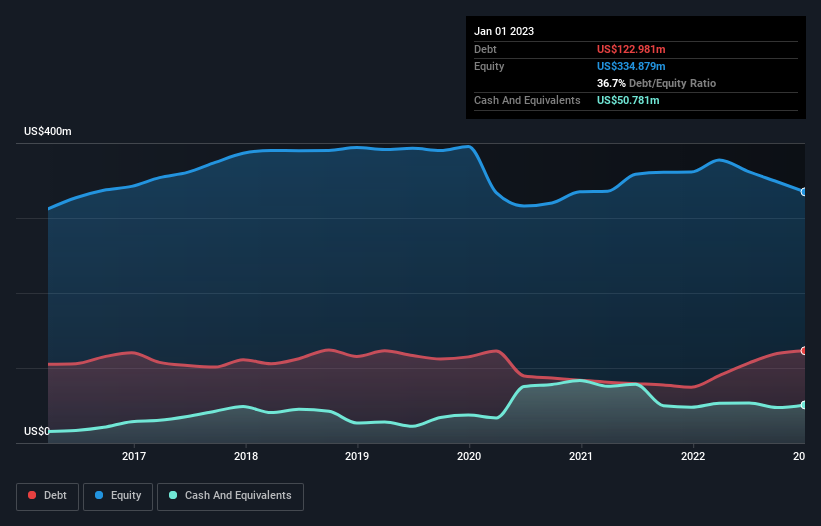The external fund manager backed by Berkshire Hathaway's Charlie Munger, Li Lu, makes no bones about it when he says 'The biggest investment risk is not the volatility of prices, but whether you will suffer a permanent loss of capital.' So it might be obvious that you need to consider debt, when you think about how risky any given stock is, because too much debt can sink a company. Importantly, Unifi, Inc. (NYSE:UFI) does carry debt. But is this debt a concern to shareholders?
When Is Debt A Problem?
Debt assists a business until the business has trouble paying it off, either with new capital or with free cash flow. If things get really bad, the lenders can take control of the business. However, a more usual (but still expensive) situation is where a company must dilute shareholders at a cheap share price simply to get debt under control. Of course, plenty of companies use debt to fund growth, without any negative consequences. When we examine debt levels, we first consider both cash and debt levels, together.
Check out our latest analysis for Unifi
How Much Debt Does Unifi Carry?
You can click the graphic below for the historical numbers, but it shows that as of January 2023 Unifi had US$123.0m of debt, an increase on US$74.4m, over one year. However, because it has a cash reserve of US$50.8m, its net debt is less, at about US$72.2m.

How Healthy Is Unifi's Balance Sheet?
We can see from the most recent balance sheet that Unifi had liabilities of US$58.8m falling due within a year, and liabilities of US$134.5m due beyond that. Offsetting this, it had US$50.8m in cash and US$70.8m in receivables that were due within 12 months. So its liabilities outweigh the sum of its cash and (near-term) receivables by US$71.8m.
While this might seem like a lot, it is not so bad since Unifi has a market capitalization of US$167.9m, and so it could probably strengthen its balance sheet by raising capital if it needed to. But it's clear that we should definitely closely examine whether it can manage its debt without dilution. The balance sheet is clearly the area to focus on when you are analysing debt. But ultimately the future profitability of the business will decide if Unifi can strengthen its balance sheet over time. So if you're focused on the future you can check out this free report showing analyst profit forecasts.
In the last year Unifi had a loss before interest and tax, and actually shrunk its revenue by 3.7%, to US$734m. We would much prefer see growth.
Caveat Emptor
Over the last twelve months Unifi produced an earnings before interest and tax (EBIT) loss. To be specific the EBIT loss came in at US$16m. When we look at that and recall the liabilities on its balance sheet, relative to cash, it seems unwise to us for the company to have any debt. So we think its balance sheet is a little strained, though not beyond repair. However, it doesn't help that it burned through US$33m of cash over the last year. So in short it's a really risky stock. When I consider a company to be a bit risky, I think it is responsible to check out whether insiders have been reporting any share sales. Luckily, you can click here ito see our graphic depicting Unifi insider transactions.
Of course, if you're the type of investor who prefers buying stocks without the burden of debt, then don't hesitate to discover our exclusive list of net cash growth stocks, today.
New: AI Stock Screener & Alerts
Our new AI Stock Screener scans the market every day to uncover opportunities.
• Dividend Powerhouses (3%+ Yield)
• Undervalued Small Caps with Insider Buying
• High growth Tech and AI Companies
Or build your own from over 50 metrics.
Have feedback on this article? Concerned about the content? Get in touch with us directly. Alternatively, email editorial-team (at) simplywallst.com.
This article by Simply Wall St is general in nature. We provide commentary based on historical data and analyst forecasts only using an unbiased methodology and our articles are not intended to be financial advice. It does not constitute a recommendation to buy or sell any stock, and does not take account of your objectives, or your financial situation. We aim to bring you long-term focused analysis driven by fundamental data. Note that our analysis may not factor in the latest price-sensitive company announcements or qualitative material. Simply Wall St has no position in any stocks mentioned.
About NYSE:UFI
Unifi
Engages in the manufacture and sale of recycled and synthetic products in North America, Central America, South America, Asia, and Europe.
Undervalued with mediocre balance sheet.
Similar Companies
Market Insights
Community Narratives



